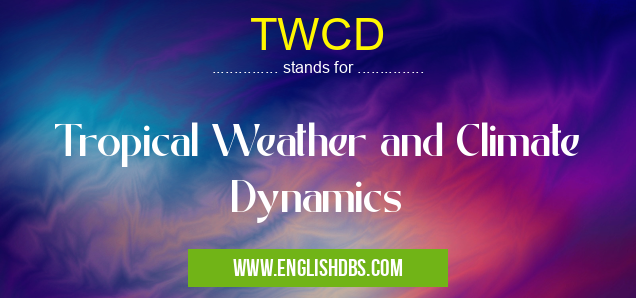What does TWCD mean in CLIMATE
Tropical Weather and Climate Dynamics (TWCD) is a field of study focused on the study of weather and climate in the tropical regions of the world. It encompasses a wide range of topics, from large-scale atmospheric circulation to extreme precipitation events, ocean-atmosphere interactions, and more. This research provides insight into how these features interact with other environmental variables, such as precipitation levels, temperatures, sea surface temperatures, El Nino phenomenon and more - helping us better understand our planet's dynamic atmosphere and help inform decision makers on how best to respond to related environmental changes.

TWCD meaning in Climate in Academic & Science
TWCD mostly used in an acronym Climate in Category Academic & Science that means Tropical Weather and Climate Dynamics
Shorthand: TWCD,
Full Form: Tropical Weather and Climate Dynamics
For more information of "Tropical Weather and Climate Dynamics", see the section below.
Explaining TWCD
TWCD examines the physical processes behind variations in atmospheric circulations over tropical regions - looking at both global-scale patterns (such as El Nino) as well as local-scale phenomena. These circulations impact a wide variety of human activities directly or indirectly through their influence on regional weather and climate conditions. Global-scale processes are studied using a combination of theoretical models, observations from satellites and ground stations, as well as computer simulations. Meanwhile regional studies examine microclimates in different parts of the tropics to better anticipate how future climate change may influence them. Ultimately these studies seek to improve our understanding of regional climate change impacts so that proper measures can be taken to adapt accordingly.
Essential Questions and Answers on Tropical Weather and Climate Dynamics in "SCIENCE»CLIMATE"
What is Tropical Weather and Climate Dynamics?
TWCD is an interdisciplinary sub-field of atmospheric sciences, covering the Earth's tropical atmosphere. It includes research on weather, climate variability and its impacts on human activities and ecosystems. The field covers topics such as El Niño—Southern Oscillation, monsoons, hurricanes, thunderstorms, land-atmosphere interactions and climate change.
What are the benefits of studying Tropical Weather and Climate Dynamics?
By understanding the dynamics of tropical weather and climate systems we can better anticipate extreme weather events like hurricanes, floods and droughts. This knowledge allows us to better prepare for such events in terms of disaster risk reduction or adaptation measures by regional stakeholders. Additionally, better process understanding involving atmospheric components helps us to project future climates more accurately.
How does TWCD research help understand human-environment interactions?
TWCD research provides valuable insight into how people's activities affect the environment in tropical areas. For example, it looks at how phenomena like deforestation influences precipitation patterns or how local management practices influence coastal erosion. This knowledge can help inform decision-making processes in terms of sustainable resource use at regional levels.
How can I get involved with research related to TWCD?
If you are interested in getting involved in research related to TWCD you should look for academic programs focused on this subject worldwide or contacts within relevant organizations studying this area such as universities, international agencies or NGOs. Additionally you could try looking for opportunities with fellowships programs related to this field as well as participating in international conferences dealing with this topic.
What types of data do I need for studying TWCD?
TWCD studies require a range of observational data from both ground-based stations as well as satellites — ranging from meteorological information such temperature and humidity to oceanic parameters like sea surface temperatures or wind speed measurements. Additionally numerical models providing information about future conditions also play an important role within these studies.
Why is a multidisciplinary approach important when researching TWCD?
A multidisciplinary approach is essential when researching any field dealing with natural hazards such as those falling under the umbrella term “Tropical Weather and Climate Dynamics†(TWCD). As each phenomenon requires different types of knowledge ranging from physical sciences all the way through social sciences a comprehensive view is needed in order to successfully assess related risks and their impacts.
What role do international agencies like UNFCCC play when researching TWCD?
International organizations such as UNFCCC work mainly towards tackling global issues related to climate change mitigation and adaption strategies by providing policy advice based on scientific evidence produced by multiple stakeholders around the world — including those researching tropical weather and climate dynamics (TWCD). By doing so UNFCCC helps inform decision makers regarding solutions that encompass both environmental protection aspects together with economic interests.
Final Words:
The knowledge gained from TWCD plays an essential role in helping us manage our environment responsibly. By examining physical processes within the tropical atmosphere we can better anticipate potential changes in weather patterns that could have serious consequences for human activities living in those areas. With this improved understanding we can take preemptive steps to ensure the sustainability of our environment for generations to come.
